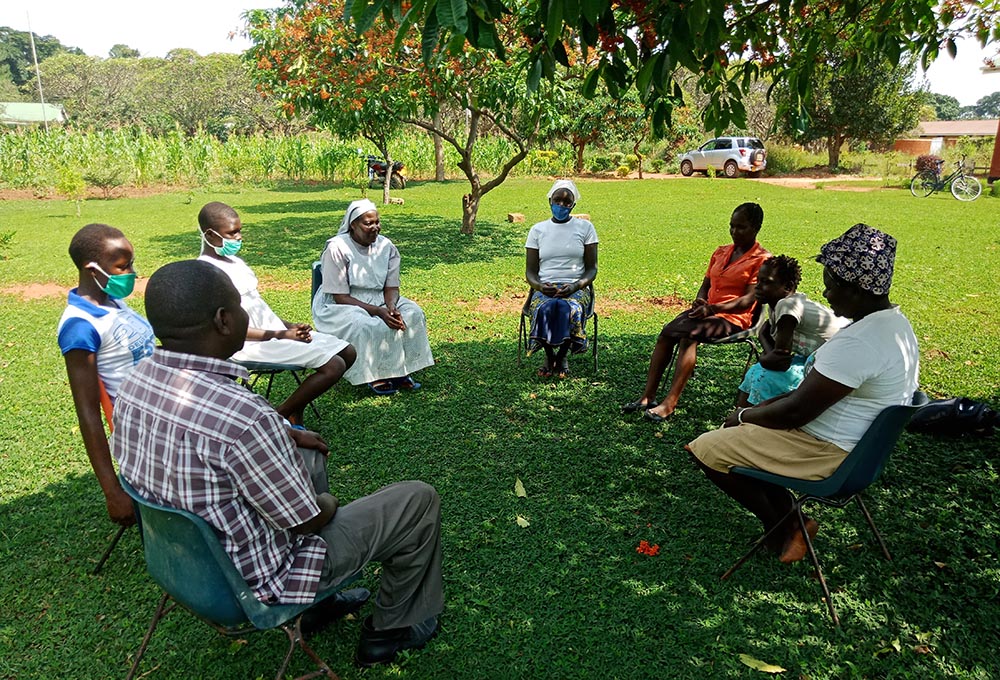
Sr. Florence Aculo Osara of the Missionary Sisters of Mary Mother of the Church in Uganda conducts a group counseling session. (Mary Lilly Driciru)
More than 21,000 cases of child abuse were registered in Uganda by August 2020 during the COVID-19 lockdown, according to police records and reported by New Vision, Uganda's daily newspaper, on Aug. 9, 2020. Cases of abuse and gender-based violence include physical torture (some victims are seen with deep cuts), sexual abuse and other psychosocial problems inflicted by parents or parental figures.
Similar cases from upcountry are unrecorded, since victims often get help from the sisters who serve in different parts of the country. About 20 children within one week flocked to the Missionary Sisters of Mary Mother of the Church's Bishop Asili Counseling, Rehabilitation and Community Centre in Lira, to meet Sr. Florence Aculo Osara and her team, who offer psychosocial and clinical counseling services to the needy during this critical moment of COVID-19 pandemic lockdown.
Osara told me, "Many couples got injured as a result of battering. Many of them have opted for separation, others divorced; some lost their properties to partners, as others are hustling to recover their self-esteem and respect. The numbers of mentally destabilized people are increasing, and yet more people are resorting to alcohol and drug abuse to find 'solutions' to life challenges. Cases of suicidal tendencies and death are on the rise. Despite these problems, we have reconciled many families and instilled the spirit of prayer, support and love in them through group counseling."
She added, "During the COVID-19 lockdown, many children ran to our counseling center when families unfortunately became unsafe for children and some of the youths. We reached out to families while observing the COVID-19 guidelines. We are also advocating against all the social injustices affecting the family through Radio Wa [a community radio] with the help of the Association of Religious in Uganda — the ARU Secretariat and other partners."
In their ministry, the sisters discovered a 4-month-old baby whose mother was found negotiating a price for her baby with human traffickers! A parent contracted an 8-year-old girl for marriage to a "rich" man.
The lockdown has exposed other challenges, like inadequate food in some families. When school was in session, some children depended on school rations, with one meal at home. With lockdown, some families could no longer afford to feed all their members. When children are crying from hunger, and their fathers demand their mothers' attention, domestic violence can result.
While addressing domestic violence, the sisters make referrals to the clan leaders, the district local government through sub-county headquarters, and involve police in some cases. Besides marital infidelity, or rape and defilement, some men demand cash from their wives for consuming alcohol, and they expect timely meals without contributing to family resources.
Other challenges include poor communication in families, character assassination and the like. Some male parents imagine that female parents are only communicating to their offspring, and feel disregarded.
"I don't like to stay home because my parents are ever disagreeing. Sometimes they tell us to go and look for happiness! I'm happy that sisters are helping us to solve some of the problems," a 12-year-old girl remarked.
Such conflicting situations escalate pupils' dropping out of school — especially girls — since there is lack of control and follow-up from parents. One outlet is child marriage. Child mothers who become stressed due to overload of family responsibility find ways back to their biological homes, where they are often denied access.
Contrary to the Catholic social teaching's principle of subsidiarity, some couples have been submerged into stereotyped cultural gender roles and beliefs that have backfired on them. Because some men see women as taking over their responsibilities, they feel insecure when women perform their duties. "I discovered that some men have low self-esteem and they think women are taking over their responsibilities instead of playing complementary roles in the family," Osara lamented.
Advertisement
Greed over family properties like land is yet another challenge. Some women are chased away by their husbands after over 20 years of marriage and their properties are seized. Others have nowhere to go but just have to stay in a bad situation. Consecrated persons are also trying to address these issues of broken family relationships that have led to stress and stigma.
Other dramatic episodes involve men who left their villages for urban centers, after selling off their ancestral properties like land. The dilemma came where the COVID-19 pandemic created tension in townships, and many people went back to their villages, including those who sold their property! Such people are yet another burden and source of conflict since they cannot claim back the land they sold.
Through negotiations, the sisters reconciled 32 young girls to their families after group counseling. "There are several cases of incest in the community," a sister remarked.
"We have cases of missing children in the community, where children are lured from their families under the umbrella of going to work but they are not seen again. Some of the girls have escaped and survived from captivity; efforts to trace the perpetrators is fruitless because some of the parents are afraid to tell the truth," another sister observed.
Some of the survivors are lucky to be empowered with life skills like working in a bakery. Sisters also take them through guidelines and awareness about COVID-19. Some of the children are not familiar with gender roles. Sisters teach them about the gender-based divisions of labor that are socially and economically determined by the types of work women and men do. For example, they orient the girls to their roles as "mothers" through hands-on skills.
Sisters are also educating the local community about their rights, duties and responsibilities. These lessons have helped some participants to access, control and benefit from common properties pertaining to the family. They are guided by questions like:
- "Who has access to, control over and benefits from the following family resources? Men or women, children or both?"
- "What are the causes of the unequal access to, control over and benefits from the resources? why do we have this?"
- "What are the effects of inequality on men, women and children?"
- "How do you feel about unequal access to, control over and benefits from the resources?"
- "What can we do to change this inequality? When do we want to change this?"
Socialization and teamwork are yielding fruits, as sisters use the tools of empowerment, through single and group counseling.
[Mary Lilly Driciru, a member of the Missionary Sisters of Mary Mother of the Church, serves as communications coordinator at the Secretariat of the Association of Religious in Uganda.]






